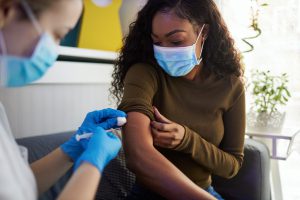Health care providers across the U.S. are grappling with significant challenges in communicating about COVID-19 vaccines, according to a study by CUNY SPH doctoral students Amanda Pierz and Dima Masoud, CUNY SPH Foundation Director of Programs Lauren Rauh, and faculty members Chris Palmedo and Scott Ratzan.
For the study, the researchers conducted focus groups with 44 health care providers from 24 states. The providers expressed frustration due to the constant need to address vaccine misinformation during appointments with unvaccinated patients. This situation presents unique challenges compared to previous vaccine hesitancy issues, making the COVID-19 pandemic particularly difficult for health care communication.
To navigate these challenges, the providers expressed a strong desire for up-to-date, evidence-based resources that can help them keep pace with rapidly changing COVID-19 guidelines. Additionally, patient-facing educational materials designed to support vaccination discussions are highly valued by providers, although they report that such materials are not frequently available.
The research underscores the critical role health care providers play in navigating the complex factors influencing vaccine decisions, such as health care access and individual knowledge. It emphasizes the need for a comprehensive communication infrastructure to support effective provider-patient communication about vaccines.
“As the fight against COVID-19 continues, supporting health care providers in their communication efforts remains crucial for promoting vaccine uptake,” says Pierz.




